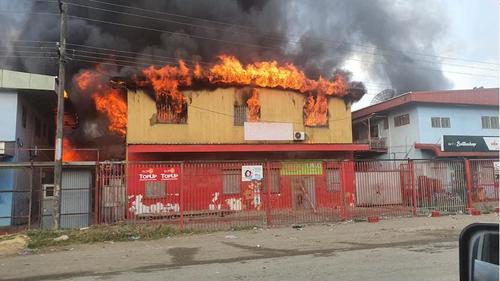Beijing Influence Expands After Solomon Islands Accepts Chinese Offer For Riot Police Help
In the latest Asia-Pac domino piece to quietly fall in China’s favor on Christmas eve, Chinese police officers and equipment will soon be sent to Solomon Islands to help defuse months of civil unrest, a move that is already causing anxiety for Australian officials.

On Thursday Prime Minister Manasseh Sogavare’s besieged government announced it would accept Beijing’s offer of assistance to strengthen its anti-riot policing capabilities, Australia’s ABC News reported. In a statement, the government said it was “mindful of the urgent need to strengthen Royal Solomon Islands Police Force capability and capacity to respond to future unrest”.
“The government has agreed to accept the Peoples’ Republic of China’s offer of riot equipment and six Police Liaison Officers to equip and train Royal Solomon Islands Police Force with the skill sets complimenting ongoing training received under existing bilateral assistance,” it said.
Last month we reported that 73 Australian Federal Police and 43 Australian Defence Force personnel were dispatched to the troubled Pacific nation following days of rioting against Sogavare’s government. A decision by Solomon Islands to switch diplomatic allegiances from Taiwan to China in 2019 is one of the factors blamed for unhappiness with the Pacific nation’s government.
Sogavare has blamed “external factors” for the recent unrest in his country and the Premier of Malaita Province, Daniel Suidani, has been outspoken in his opposition to the national government’s decision to back Beijing rather than Taipei.
Following November’s riots, the federal government was relieved that the first call for help came to Canberra, rather than Beijing, but Prime Minister Scott Morrison insisted Australia was taking no part in “internal issues of the Solomon Islands”.
Defense and diplomatic sources have told the ABC they believe Solomon Islands is the first government in the Pacific to accept this level of Chinese help specifically for anti-riot for domestic policing, and there are concerns more assistance will be sought from Beijing in the future.
Over recent days Australia’s police-led deployment to Solomon Islands has been gradually reduced, but 40 AFP members, 15 ADF personnel and three Department of Foreign Affairs and Trade (DFAT) staff remain there. In a statement, a spokesperson for DFAT said it was aware that China was sending reinforcements.
“Australia, together with our Pacific family partners Fiji, Papua New Guinea and New Zealand, responded swiftly and effectively to the 25 November request from Solomon Islands government to help Royal Solomon Islands Police Force (RSIPF) restore calm in Honiara following civil unrest,” the spokesperson said.
“Since that time, Australia and Pacific family partners have successfully supported the RSIPF to maintain a stable and calm situation.
“We are aware of China’s expected engagement in the security sector in Honiara. This is a matter for the Solomon Islands government.”
For China’s part, the country’s Foreign Ministry spokesman Zhao Lijian said Beijing was helping Solomon Islands respond to “grave” anti-government riots: “At the request of the government of Solomon Islands, China will provide a batch of emergency riot equipment for the police and send an ad-hoc police advisory team,” he told reporters on Thursday.
“The Chinese supplies and personnel will arrive in Solomon Islands soon and are expected to play a constructive role in enhancing the ability of the Solomon Islands police.
“China firmly supports the government of Solomon Islands in defending the country’s stability, resolutely safeguards the relations between China and Solomon Islands and the legitimate rights and interests of Chinese citizens there, and strongly condemns any illegal and violent action.”
The Australian government is yet to directly respond to Solomon Islands’ decision to accept Chinese policing assistance.
Tyler Durden
Fri, 12/24/2021 – 20:00
Zero Hedge’s mission is to widen the scope of financial, economic and political information available to the professional investing public, to skeptically examine and, where necessary, attack the flaccid institution that financial journalism has become, to liberate oppressed knowledge, to provide analysis uninhibited by political constraint and to facilitate information’s unending quest for freedom. Visit https://www.zerohedge.com